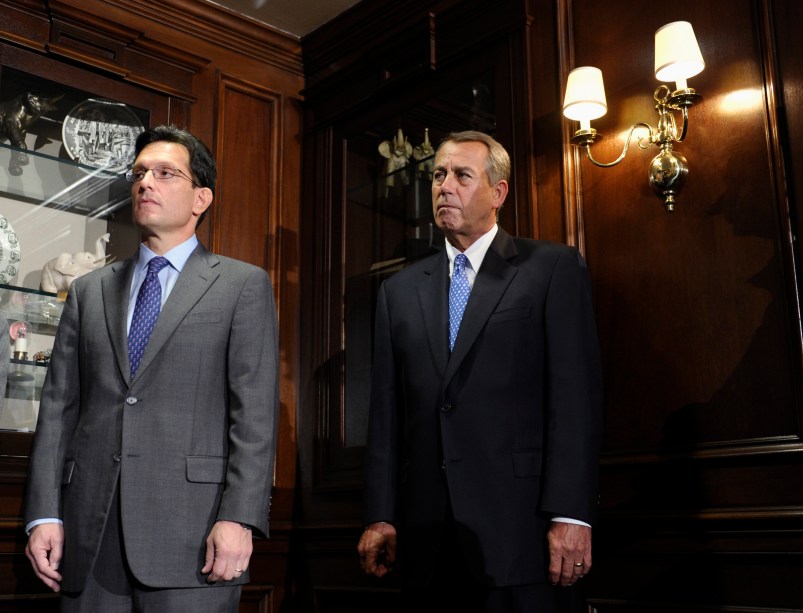House Republican leaders are eying a vote on a stopgap spending bill as a fallback to avert another government shutdown next month in case budget negotiations break down between House Budget Chair Paul Ryan (R-WI) and Senate Budget Chair Patty Murray (D-WA).
Funding expires on Jan. 15, at which point there will be another shutdown unless Congress acts. The continuing resolution planned by Republicans would set spending at the level called for under sequestration cuts: $967 billion, which includes an additional $20 billion in automatic cuts to defense programs that are required under current law starting Jan. 15.
But pushing to continue those painful spending cuts would risk another shutdown as Democrats and numerous key Republicans strongly oppose spending at sequester levels.
“[I]f Ryan and Murray fail to get an agreement, we’ll be ready to move a short-term CR at the Budget Control Act number,” said a House GOP leadership aide. “No decision has been made on the duration of such a CR, or the timing of a potential vote.”
The deal being negotiated by Ryan and Murray would set spending levels for the next few years and mitigate the pain of the sequester by replacing it with a mix of targeted spending cuts and non-tax revenues from government fees. The two met on Wednesday. They’re zeroing in on a spending level of roughly $1 trillion, but talks remain fluid and the deal could yet fall apart. They have until Dec. 13 to reach an agreement.
There are several factors working in favor of a budget deal. Republicans took a pummeling as a result of the government shutdown in October and want to avoid repeated showdowns and brinkmanship. GOP defense hawks are screaming against the sequester cuts to military programs, and appropriators are clamoring to start writing budgets again.
The primary obstacle to a budget deal is House conservatives, who tend to have their way in the chamber, and want to preserve every dollar of spending cuts under the sequester. If the Ryan-Murray talks collapse, the chances of a shutdown increase dramatically because a stopgap bill at $967 billion may not be able to pass the House. Republican military hawks and appropriators would likely rebel, and Democrats have made clear they they won’t accept another clean continuing resolution at the sequester level.
“I’m not going to support a short-term CR that leads to a $967 [billion] level [of spending],” House Minority Whip Steny Hoyer (D-MD) told reporters this week. “I believe that hurts our national security, it hurts our economy, and it undermines our responsibility of running government at a level that is productive for our people.”
The Democrat said it’s time to end governance by stopgap spending bills and come to a budget deal, warning Republicans not to undermine or walk away from the Ryan-Murray talks.
“[House Appropriations Chair] Hal Rogers has said the sequester levels, which would be reflected in the CR, are ill conceived and unworkable. He’s right. So we shouldn’t pursue a CR, and we should get a budget deal done,” Hoyer said. He said getting a budget agreement is not an issue of time, “it’s a matter of will — of willingness to compromise.”
House Republicans hope to vote on the CR next week before the House adjourns for Christmas break in order to avoid a mad dash to avert a shutdown in the new year.
A wild card in a possible government shutdown fight is Obamacare. Republicans tried and failed to undermine the law in shutdown showdown this fall. But the law’s coverage expansion and core benefits take effect on Jan. 1, so if conservatives feel they have the upper hand, or sense they have one final chance to strike at the law before repeal becomes politically untenable, they might incite another standoff.
Boehner held his cards close to the vest when asked at his at his weekly press conference Thursday about the Ryan-Murray framework for a budget agreement.
“I’m hopeful that Chairman Ryan and Senator Murray would be able to come to an agreement,” he said. “I haven’t seen the agreement. We’ll wait and see what it looks like.”






